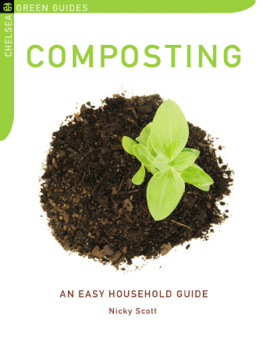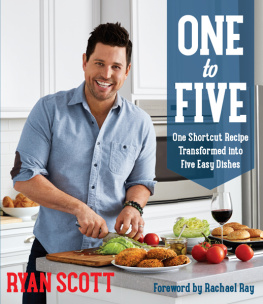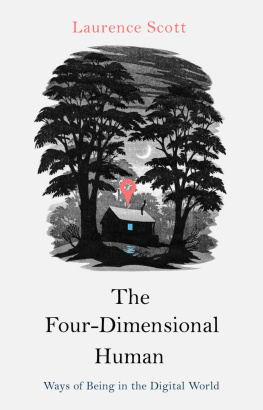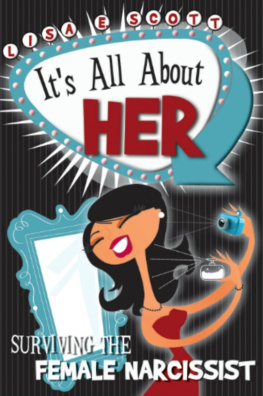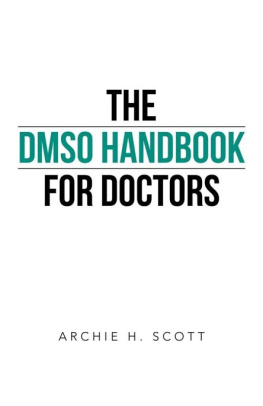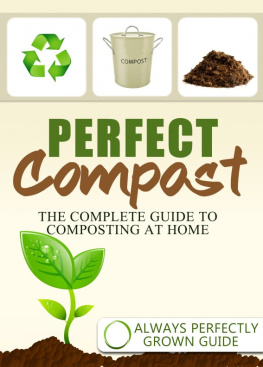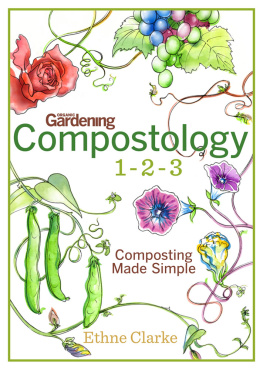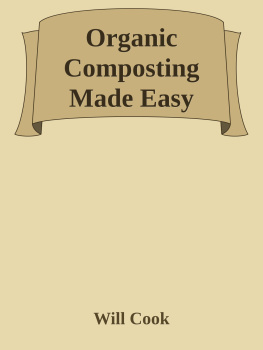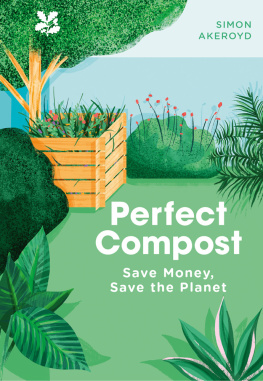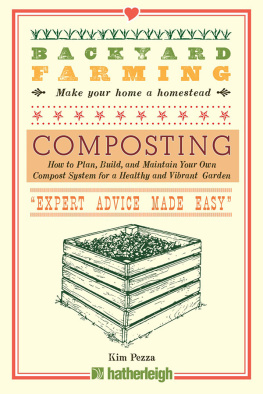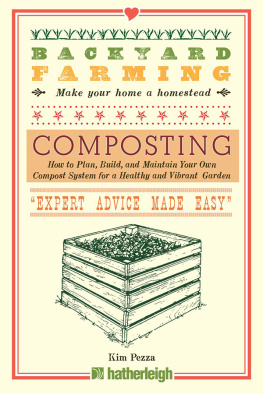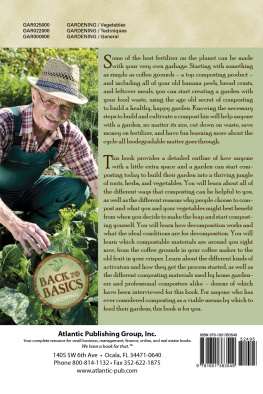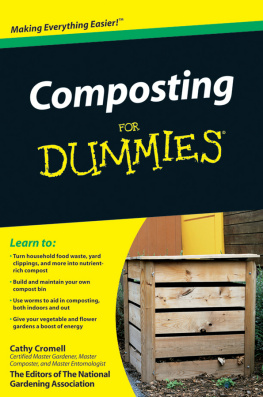
Composting
AN EASY HOUSEHOLD GUIDE

Composting
AN EASY HOUSEHOLD GUIDE
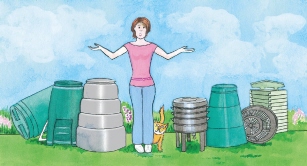
Nicky Scott
Chelsea Green Publishing Company
White River Junction, Vermont
First published in 2005 by Green Books Ltd
Foxhole, Dartington
Totnes, Devon, TQ9 6EB, UK
Text Nicky Scott 2005-7
Illustrations Roy Chadwick 2005-7
All rights reserved
This book is dedicated to the memory of Steve Portsmouth, who was a leading light in the recycling world and a keen composter. Steve took over the running of South Molton Recycle and made it one of the best community-run projects in the UK.
Thanks all who contributed to this book, especially Jon Clift, Amanda Cuthbert, and John Elford at Green Books.
DISCLAIMER: The advice in this book is believed to be correct at the time of printing, but the author and publishers accept no liability for actions inspired by this book.
10 9 8 7 6 5 4 3 2 1 07 08 09 10
Printed in Canada
Printed on 100-percent postconsumer-waste recycled paper
First Chelsea Green printing July, 2007
Library of Congress Cataloging-in-Publication Data
Scott, Nicky.
Composting : an easy household guide / Nicky Scott.
p. cm.
ISBN 978-1-933392-74-5
1. Compost. I.Title.
S661.S36 2007
631.8'75dc22
2007021453
Chelsea Green Publishing Company
P.O. Box 428
White River Junction, VT 05001
(802) 295-6300
www.chelseagreen.com
Contents
Once you start composting, you get hooked! It is a very simple and satisfying process: not only will your garbage can be lighter, but it wont smell so disgusting and neither will your compost heap, if you follow the simple instructions in this book.
Even if you do not have a garden, you may have access to a communal green space, which you can manage either yourself or in partnership with others; and green spaces need compost! Ive visited housing estates in London where green spaces are not much in evidence, and theres plenty of composting going on, with the finished compost being used in window boxes, hanging baskets, and on open community spaces (see ).
You can still make compost in a very small space even if you only have a tiny garden, or just a balcony or window sill.
Local authorities vary in the amount of help they offer. Some may offer cut-price composting bins, information, and even training. Universities and botanical gardens may have compost hot lines and regular get-togethers so that people can share experiences and get further help. Why not find out if there are any composting groups in your areas?
In the past, composting was seen as an activity that only gardeners became involved with, and was surrounded by a huge amount of mystique; many gardeners swore by their secret systems. Nowadays, even people without gardens are composting, because they want the compost for their hanging baskets, window boxes, and planters, or because they are keen to reduce waste going to landfills, or both.
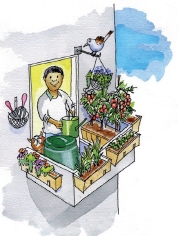
Composting has also become a hot political issue. Under European law, for example, Britain must reduce the amount of waste going to landfill, particularly waste that can be composted. To do this, we have to massively increase our recycling and composting. Reducing and disposing of garbage can be done in many ways, with incineration and land-filling as the worst options, and home composting as the very best option, since it reduces the amount of material that has to be disposed of in other ways.
You can make a difference. With the enormous problems that face the world, it may seem that our individual efforts are going to be completely insignificant, but many problems we confront are created by individual actions, and we each have enormous powers to make a change. With composting, we can effect change in several ways:
Not only can we stop buying peat-based compost, which causes the destruction of our peat bogs, but we can also make peat-free compost ourselves from materials we commonly put in the garbage can. Composting also helps prevent global warming by reducing emissions of methane, a powerful greenhouse gas that gets produced when organic waste decomposes when buried in landfill sites.
It is estimated that about one quarter of all the United States methane emissions are due to organic waste rotting in landfill sites.
The mission statement of the Community Composting Network, of which I was Chairman for many years, is Everyone composting! We feel that just about sums it all up. If everybody were composting, the environment we all live in, from the local level right up to the whole planet, would be in a far better state. This book will give you all the information you need for successful composting.
Nicky Scott
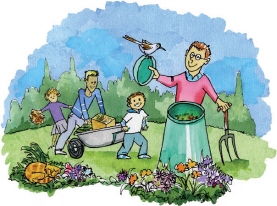
There are lots of good reasons to make compost:
A third to two-thirds of the average garbage can contents can be composted, so you can make a big difference.
Making compost lightens your garbage can and stops it from smelling.
This means that less is sent to landfill, which in turn means that less noxious liquids and greenhouse gases especially methane are produced.
Composting saves you money no more peat-based compost will need to be bought!
Compost improves all soils it opens up clay soils, and holds moisture and nutrients in light and sandy soils, reducing the need to water and fertilize.
Compost helps make healthy soils, and healthy soils lead to healthy plants (and people and animals), which are less prone to pest and disease attack.
Last its fun, easy, and very satisfying!
If you still need convincing how simple and quick making compost can be, try this simple demonstration. Be ready to be amazed!
1. Save up some cardboard and paper: toilet-paper roll centers, ripped-up cardboard boxes, cereal boxes, scrunched-up envelopes (minus the windows), paper towels all those bits and pieces that are difficult to recycle.
2. Mow the lawn.
3. Mix or layer grass cuttings and cardboard/scrunched paper together thoroughly roughly half and half by volume. If in doubt, err on the side of putting in more cardboard/ scrunched paper. If layering, aim to get the layers roughly about 1inch thick, but dont be too fussy just dont put the grass on too thickly!
4. Put in a pile or in a compost container; this can be anything which will contain the heap it could be a plastic compost bin, or it could be a homemade bin made from pallets or scrap wood, etc. Repeat every time you mow the lawn.
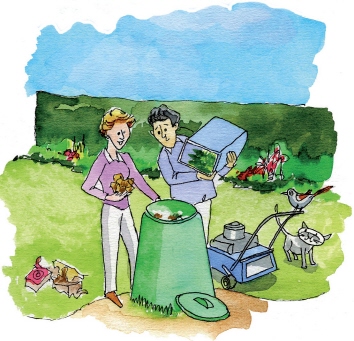
5. Sit back and wait for compost to happen!
Its as easy as that!
Put it anywhere that is convenient, but easily accessible from the kitchen.
Putting the bin in the sun will speed up the composting process, but it will still work in the shade.
Next page
